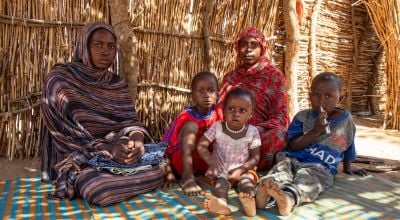
Read our 2023 annual report

Knowledge Hub
“I began with two pigeons, and I now have four. My plan is to make them bigger and later sell them, and then use the money to help my family buy things like sugar, and other essentials.”
Younous is standing outside a sunbaked shelter, knitted together with thin branches and roofed with tarpaulin. As the evening sun casts long shadows on the ochre dirt, a pigeon with brilliant white plumage sits nestled in his hands.
His mother, Zahra, looks on, and wonders where her husband is.
“My husband escaped just like us, but he went to hide somewhere else in Sudan and we do not have any news about his whereabouts. There is no day that goes by that I do not think about him.”

Flight
Zahra and her 10 children are among an estimated 500,000 Sudanese people who have fled to Chad since an outbreak of violence between rival factions in Spring 2023.
When the fighting reached their home village, Zahra and her children fled for their lives, hoping to reach the border with Chad.

“The journey was very difficult,” says Zahra. “We were robbed and beaten on the journey. They did not even have any compassion for my children. They beat them too.
"We were worried every single day. We walked for many days. I would ask myself if I would even get a place to stay with my children once we arrived in Chad, and what I was going to give them to eat.”

Surviving, as refugees
The family eventually crossed a river into Chad - Zahra had saved her children from conflict, but their struggle to survive as refugees had only just begun.
“I am always struggling to find something to eat for my family," says Zahra. "During the rainy season, we go to the fields to work to get some money to help us. Sometimes we also go to the bush to cut some firewood, which we then sell for money. But now, because it is the dry season, there is no farming, and it has become hard to find some money to help my family.”
When people are displaced by violence, they are forced to leave behind their land, livestock, and livelihoods. As well as the tangible loss of income and access to food, the displaced suffer a crisis of agency and confidence, their future torn from their hands.

“When we were in Sudan, we used to farm, and it was always enough for us," recalls Zahra. "In the morning, we would have our breakfast and once we were done, the children and I would go to the farm and then at midday we would head to the market to sell some of the produce we have harvested. That is how life was for us back home. We used to plant millet, sorghum, groundnuts, okra, and tomatoes.
"The thing I miss the most about home is my independence because when I was at home, I could work, and I could cater to all my needs. But since I arrived here, there is nothing that I can do. I cannot work and I have to wait for the NGOs to give us food, which is never enough for my family.”

Concern and Irish Aid
When families flee violence, they may not have the time, or the vehicle, to take their belongings. They arrive to barren camps, often on foot, with only the clothes they are wearing, and without the means to meet their immediate, basic needs. Their survival hangs in the balance.
Concern Worldwide, with the support of Irish Aid, is supporting Sudanese refugees in Chad to survive by providing basic shelter, healthcare, and essential household items.
“Concern gave us two ground mats, two mosquito nets, two jerry cans and a kitchen set," Zahra said. "When we arrived in the refugee camp, we did not have anything, these things helped us so much. The jerry cans helped us to go and gather water, the pots allowed us to cook our food, and the mats and blankets enabled us to have something to sleep on and to cover ourselves with.
“Without this support, things would be very difficult for us. Thank you, because without them, life would be very difficult for us.”

Zahra and her family are surviving in Chad.
But her mind, and her heart, is elsewhere.
“I don’t even know where he is, and he does not know where we are because we have no way of communicating as he had left home before the war started.
"I cannot go back to Sudan because in Sudan, you cannot even go to the river to get water, you cannot go in the field to work, because you will be killed. I want to stay here with my children and to try and meet their needs. But if the conflict stops, and everybody is going back, I will go.
"But alone? No. I cannot go back alone.”
All names have been changed




